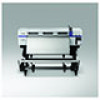Epson SureColor S30670 User Manual - Page 138
Media, The printed surface is scuffed or soiled., Media Is Creased
 |
View all Epson SureColor S30670 manuals
Add to My Manuals
Save this manual to your list of manuals |
Page 138 highlights
The printed surface is scuffed or soiled. o Is the media too thick or too thin? Check media specifications to confirm that it is compatible with the printer. If you are using a software RIP, contact the manufacturer for information on the settings and media that can be used. o Is the media wavy? Certain types of media may develop waves under some conditions (humidity and temperature) while installed in the printer. If a wave has developed, press the d button in the control panel to feed the media and avoid the affected area. We recommend that you lower the temperature and humidity to prevent waves developing. o Is the media creased or folded? Media that is creased or folded may rise from the platen and contact the print head, resulting in smudges or uneven colors. o Are the wiper, caps, or print head stained? Ink clots or lint around the wiper, caps, or print head may result in stains caused by a build-up of ink. Clean the affected area. See "Regular Maintenance" on page 89. o Is the print head scuffing the printed surface? Smear caused by the print head scuffing the media can be prevented by adjusting the Platen Gap to suit the media. See "Platen Gap" on page 69. Media Media Is Creased o Are the Media Tension and Feed Speed options in the setup menu correct for the current media? If these options are not correctly adjusted for the current media, the media may be creased or torn during printing. See "Media Tension" on page 73 and "Feed Speed" on page 73. o Are the heaters set too high? Adjust heater temperature to suit the media. Problem Solver 138















